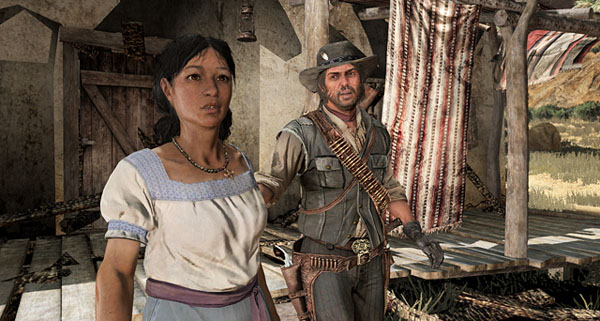This post has not been edited by the GamesBeat staff. Opinions by GamesBeat community writers do not necessarily reflect those of the staff.
Editor's note: While Carlos admits that Rockstar's male-focused sex scenes aren't perfect, he contends that given the technological limitations of the current hardware set, they present the most tonally cohesive forays into the subject to date. – James

Most people associate Rockstar Games with violence, mayhem, drugs, and a strong narrative focus. One thing advocates of the medium seem to be missing — among the quick jabs toward Grand Theft Auto's sophomoric humor — is how successful they have been at bringing sex into the gaming fold.
As far back as Custer's Revenge for the Atari 2600, sex has been something developers have been looking to integrate into their games. Video game worlds, after all, are hyperbolized versions of our real lives. It seems normal to want to incorporate every aspect of reality into them.
Earlier in the year, Quantic Dream's high-profile game Heavy Rain showed the world two characters in their most vulnerable states. Their stories intersected at low points in their lives, and sexual expression helped them through it.

It was a moment that should have worked, but the conventions that developers adhere to got in the way. Graphically, Heavy Rain looked incredible, but robotic hand gestures and stilted animation don't necessarily convey a strong image of two characters caring about each other.
Even a game like Viva Piñata has dabbled in sex by creating female and male genders for all the piñatas inhabiting the title's garden. These games deal with the primal urge of intercourse as a means of procreation.
 It's supposed to be a kid's game, though, so the title portrays sex as two animals dancing around in a hut with heart bubbles popping up all over the place. This "romance dance" is a cute way to get the idea across.
It's supposed to be a kid's game, though, so the title portrays sex as two animals dancing around in a hut with heart bubbles popping up all over the place. This "romance dance" is a cute way to get the idea across.
As diametric extremes, both games fail, however. Heavy Rain's example was so mechanical that it pulled you out of the experience, and the abstract nature of Viva Piñata's representation glosses over the act itself.
Rockstar has been the most successful because they've stuck to the more reckless and adventurous side of sex . You can see this more palpable version of human sexuality in movies such as the recent drama The Kids Are All Right — a film that involved top-tier actors and mature themes. A more well-known example would be sex as featured in American Pie or countless other teenage comedies.
Both Grand Theft Auto: The Ballad of Gay Tony and Red Dead Redemption feature scenes that portray sex more accurately than most video games — even if these scenes usually include party people and couples of the more adventurous sort.
To be fair, both games express sex from a typically male perspective: a man atop a woman in an exposed place (a public bathroom in Gay Tony and a kitchen in Red Dead).
But it's not so much that Rockstar is pusing male wish-fulfillment fantasies; it's how the encounters fit into the medium as it currently exists. They are believable scenes that don't pull you out of the experience and aren't afraid to mask themseleves as "romance dances."
 Developers shouldn't feel the need to create intimate, slow-burning scenes when the physicality and precision of movement isn't yet up to snuff in games. Nor should they feel the need to address sex in a kid's game. The sexually explicit trysts in Rockstar games actually add to the atmosphere that The Ballad of Gay Tony and Red Dead Redemption try to foster.
Developers shouldn't feel the need to create intimate, slow-burning scenes when the physicality and precision of movement isn't yet up to snuff in games. Nor should they feel the need to address sex in a kid's game. The sexually explicit trysts in Rockstar games actually add to the atmosphere that The Ballad of Gay Tony and Red Dead Redemption try to foster.
The real question lies in whether the tech will ever get to a place where the uncanny valley doesn't hamper intimate situations. With this console generation lingering, we're seeing graphical stagnation. If that's how video games will be going forward than it may be a while before see situations that surpass sex as it exists in games now.
